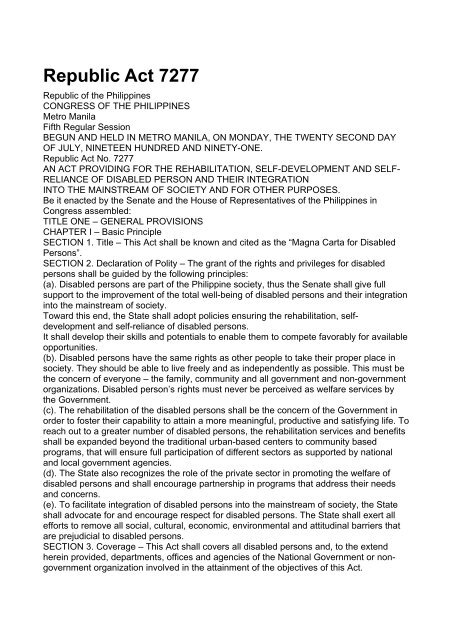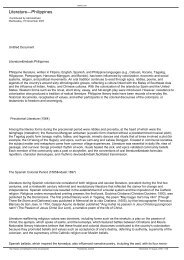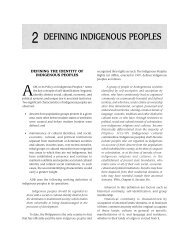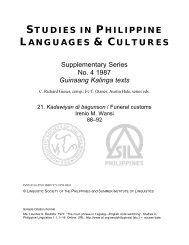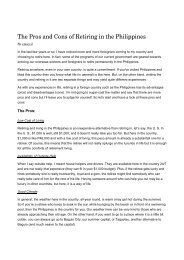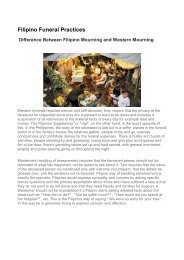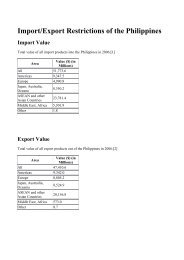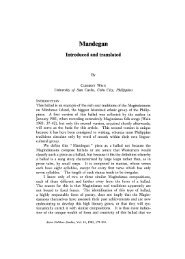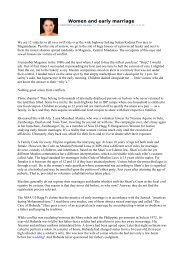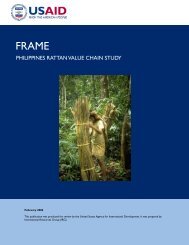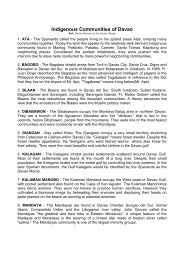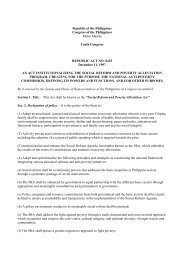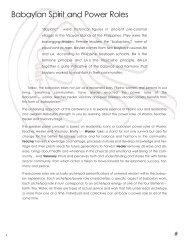Republic Act 7277 - Philippine Culture
Republic Act 7277 - Philippine Culture
Republic Act 7277 - Philippine Culture
You also want an ePaper? Increase the reach of your titles
YUMPU automatically turns print PDFs into web optimized ePapers that Google loves.
<strong>Republic</strong> <strong>Act</strong> <strong>7277</strong><strong>Republic</strong> of the <strong>Philippine</strong>sCONGRESS OF THE PHILIPPINESMetro ManilaFifth Regular SessionBEGUN AND HELD IN METRO MANILA, ON MONDAY, THE TWENTY SECOND DAYOF JULY, NINETEEN HUNDRED AND NINETY-ONE.<strong>Republic</strong> <strong>Act</strong> No. <strong>7277</strong>AN ACT PROVIDING FOR THE REHABILITATION, SELF-DEVELOPMENT AND SELF-RELIANCE OF DISABLED PERSON AND THEIR INTEGRATIONINTO THE MAINSTREAM OF SOCIETY AND FOR OTHER PURPOSES.Be it enacted by the Senate and the House of Representatives of the <strong>Philippine</strong>s inCongress assembled:TITLE ONE – GENERAL PROVISIONSCHAPTER I – Basic PrincipleSECTION 1. Title – This <strong>Act</strong> shall be known and cited as the “Magna Carta for DisabledPersons”.SECTION 2. Declaration of Polity – The grant of the rights and privileges for disabledpersons shall be guided by the following principles:(a). Disabled persons are part of the <strong>Philippine</strong> society, thus the Senate shall give fullsupport to the improvement of the total well-being of disabled persons and their integrationinto the mainstream of society.Toward this end, the State shall adopt policies ensuring the rehabilitation, selfdevelopmentand self-reliance of disabled persons.It shall develop their skills and potentials to enable them to compete favorably for availableopportunities.(b). Disabled persons have the same rights as other people to take their proper place insociety. They should be able to live freely and as independently as possible. This must bethe concern of everyone – the family, community and all government and non-governmentorganizations. Disabled person’s rights must never be perceived as welfare services bythe Government.(c). The rehabilitation of the disabled persons shall be the concern of the Government inorder to foster their capability to attain a more meaningful, productive and satisfying life. Toreach out to a greater number of disabled persons, the rehabilitation services and benefitsshall be expanded beyond the traditional urban-based centers to community basedprograms, that will ensure full participation of different sectors as supported by nationaland local government agencies.(d). The State also recognizes the role of the private sector in promoting the welfare ofdisabled persons and shall encourage partnership in programs that address their needsand concerns.(e). To facilitate integration of disabled persons into the mainstream of society, the Stateshall advocate for and encourage respect for disabled persons. The State shall exert allefforts to remove all social, cultural, economic, environmental and attitudinal barriers thatare prejudicial to disabled persons.SECTION 3. Coverage – This <strong>Act</strong> shall covers all disabled persons and, to the extendherein provided, departments, offices and agencies of the National Government or nongovernmentorganization involved in the attainment of the objectives of this <strong>Act</strong>.
SECTION 4. Definition of Terms – For purposes of this <strong>Act</strong>, these terms are defined asfollows:(a). Disabled Persons are those suffering from restriction of different abilities, as a result ofa mental, physical or sensory impairment, to perform an activity in the manner or within therange considered normal for a human being;(b). Impairment is any loss, diminution or aberration of psychological, physiological, oranatomical structure of function;(c). Disability – shall mean (1) a physical or mental impairment that substantially limits oneor more psychological, physiological or anatomical function of an individual or activities ofsuch individual; (2) a record of such an impairment; or (3) being regarded as having suchan impairment;(d). Handicap – refers to a disadvantage for a given individual resulting from animpairment or a disability, that limits or prevents the functions or activity, that is considerednormal given the age and sex of the individual;(e). Rehabilitation – is an integrated approach to physical, social, cultural, spiritual,educational and vocational measures that create conditions for the individual to attain thehighest possible level of functional ability;(f). Social Barriers – refer to the characteristics of institutions, whether legal, economic,cultural, recreational or other, any human group, community, or society which limit thefullest possible participation of disabled persons in the life of the group. Social barriersinclude negative attitudes which tends to single out and exclude disabled persons andwhich distort roles and interpersonal relationship;(g). Auxiliary Aids and Services include:1) qualified interpreters or other effective methods of delivering materials to individualswith hearing impairments;2) qualified readers, taped tests, or other effective methods of delivering materials toindividuals with visual impairments;3) acquisition or modification of equipment or devices; and4) other similar services and actions or all types of aids and services that facilitate thelearning process of people with mental disability;(h). Reasonable Accommodation include (1) improvement of existing facilities used byemployees in order to render these readily accessible to and usable by disabled persons;and (2) modification of work schedules, reassignment to a vacant position, acquisition ormodification of equipment or devices, appropriate adjustments or modifications ofexaminations, training materials or company policies, rules and regulations, the provisionsof auxiliary aids and services, and other similar accommodations for disabled persons;(i). Sheltered Employment refers to the provision of productive work for disabled personsthrough workshop providing special facilities, income producing projects or homeworkschemes with a view to given them the opportunity to earn a living thus enabling them toacquire a working capacity required in open industry.(j). Auxiliary Social Services are the supportive activities in the delivery of social servicesto the marginalized sectors of society;(k). Marginalized Disabled Persons refer to disabled persons who lack access torehabilitative services and opportunities to be able to participate fully in socioeconomicactivities and who have no means of livelihood or whose incomes fall below povertythreshold;(l). Qualified Individual with a Disability shall mean an individual with a disability who, withor without reasonable accommodations, can perform the essential functions of the
employment position that such individual holds or desires. However, consideration shall begiven to the employer’s judgement as to what functions of a job are essential, and if anemployer has prepared a written description before advertising or interviewing applicantsfor the job, this description shall be considered evidence of the essential functions of thejob;(m). Readily Achievable means a goal can be easily attained and carried out without muchdifficulty or expense. In determining whether an action is readily achievable, factors to beconsidered include –1) the nature and cost of the action;2) the overall financial resources of the facility or facilities involved in the action; thenumber of persons employed at such facility; the effect on expenses andresources, or the impact otherwise of such action upon the operation of the facility;3) the overall financial resources of the covered entity with respect to the number of itsemployees; the number, type and location of its facilities; and4) the type of operation or operations of the covered entity, including the composition,structure and functions of the work force of such entity; the geographicseparateness, administrative or fiscal relationship of the facilities in question to thecovered entity;(n). Public Transportation means transportation by air, land and sea that provides thepublic with general or special service on a regular and continuing basis;(o). Covered entity means employer, employment agency, labor organization or joint labormanagementcommittee; and(p). Commerce shall be taken to mean a s travel, trade, traffic, commerce, transportation,or communication among the provinces or between any foreign country or any territory orpossession and any province.TITLE TWO – RIGHTS AND PRIVILEGES OF DISABLED PERSONSCHAPTER I – EmploymentSECTION 5. Equal Opportunity for Employment – No disabledpersons shall be denied access to opportunities for suitable employment. A qualifieddisabled employee shall be subject to the same terms and conditions of employment andthe same compensation, privileges, benefits, fringe benefits,incentives or allowances as aqualified able-bodied person. Five percent (5%) of all casual, emergency and contractualpositions in the Department of Social Welfare and Development; Health; Education,<strong>Culture</strong> and Sports; and other government agencies, offices or corporations engaged insocial development shall be reserved for disabled persons.SECTION 6. Sheltered Employment – If suitable employment for disabled persons cannotbe found through open employment as provided in the immediately preceding Section, theState shall endeavor to provide it by means of sheltered employment. In the placement ofdisabled persons in sheltered employment, it shall accord due regard to the individualqualities, vocational goals and inclinations to ensure a good working atmosphere andefficient production.SECTION 7. Apprenticeship – Subject to the provision of the Labor Code as amended,disabled persons shall be eligible as apprentices or learners; Provided, That their handicapis not much as to effectively impede the performance of job operations in the particularoccupation for which they are hired; Provided, further, That after the lapse of the period ofapprenticeship if found satisfactory in the job performance, they shall be eligible foremployment.
SECTION 8. Incentives for Employer – (a) To encourage the active participation of theprivate sector in promoting the welfare of disabled persons and to ensure gainfulemployment for qualified disabled persons, adequate incentives shall be provided toprivate entities which employ disabled persons.(b). Private entities that employ disabled persons who meet the required skills orqualifications, either as regular employee, apprentice or learner, shall be entitled to anadditional deduction, from their gross income, equivalent to twenty-five percent (25%) ofthe total amount paid as salaries and wages to disabled persons: Provided, however, Thatsuch entities present proof as certified by the Department of Labor and Employment thatdisabled person are under their employ. Provided, further, That the disabled employee isaccredited with the Department of Labor and Employment and the Department of Healthas to his disability, skills and qualifications.(c). Private entities that improved or modify their physical facilities in order to providereasonable accommodation for disabled persons shall also be entitled to an additionaldeduction from their net taxable income, equivalent to fifty percent (50%) of the directcosts of the improvements or modifications. This section, however, does not apply toimprovements or modifications of facilities required under Batas Pambansa Bilang 344.SECTION 9. Vocational Rehabilitation – Consistent with the principle of equal opportunityfor disabled workers and workers in general, the State shall take appropriate vocationalrehabilitation measures that shall serve to develop the skills and potential of disabledpersons and enable them to compete favorably for available productive and remunerativeemployment opportunities in the labor market. The State shall also take measures toensure the provisions of vocational rehabilitation and livelihood services for disabledpersons in the rural areas. In addition, it shall promote cooperation and coordinationbetween the government and non-government organization and other private entitiesengaged in vocational rehabilitation activities.The Department of Social Welfare and Development shall design and implement trainingprograms that will provide disabled persons with vocational skills to enable them to engagein livelihood activities or obtain gainful employment. The Department of Labor andEmployment shall likewise design and conduct training programs geared towardsproviding disabled persons with skills for livelihood.SECTION 10. Vocational Guidance and Counselling – The Department of Social Welfareand Development shall implement measures providing and evaluating vocational guidanceand counselling to enable disabled persons to secure, retain and advance in employment.It shall ensure the availability and training counsellors and other suitability qualified staffresponsible for the vocational guidance and counselling of disabled persons.SECTION 11. Implementing Rules and Regulations – The Department of Labor andEmployment shall in coordination with the Department of Social Welfare and Development(DSWD) and National Council for the Welfare of Disabled Persons (NCWDP), shallpromulgate the rules and regulations necessary to implement the provision under thisChapter.CHAPTER 2 – EducationSECTION 12. Access to Quality Education – The State shall ensure that disabled personsare provided with adequate access to quality education and ample opportunities todevelop their skills. It shall take appropriate steps to make such education accessible to alldisabled persons. It shall be unlawful for any learning institutions to deny a disabledperson admission to any course it offers by reason of handicap or disability. The Stateshall take into consideration the special requirements of disabled persons in the
formulation of education policies and program. It shall encourage learning institutions totake into account the special needs of disabled persons with respect to the use of schoolfacilities, class schedules, physical education requirements and other pertinentconsideration. The State shall also promote the provision by learning institutions, ofauxiliary services that will facilitate the learning process for disabled persons.SECTION 13. Assistance to Disabled Students – The State shall provide financialassistance to economically marginalized but deserving disabled students pursuing postsecondary or tertiary education. Such assistance may be in the form of scholarship grants,student loan programs, subsidies, and other incentives to qualified disabled students inboth public and private schools. At least five percent (5%) of the allocation for the PrivateEducation Student Financial Assistance Program created by virtue of R.A. 6725 shall beset aside for disabled students pursuing vocational or technical and degree courses.SECTION 14. Special Education – The State shall establish, maintain and support acomplete, adequate and integrated system of special education for the visually impaired,hearing impaired, mentally retarded persons and other type of exceptional children in allregions of the country. Towards this end, the Department of Education, <strong>Culture</strong> and Sportsshall establish special education classes in public schools in cities, or municipalities. Itshall also establish, where viable, Braille and Record Libraries in provinces, cities ormunicipalities. The National Government shall allocate funds necessary for the effectiveimplementation of the special education program nationwide. Local government units maylikewise appropriate counterpart funds to supplement national funds.SECTION 15. Vocational or Technical and Other Training Programs – The State providedisabled persons with training in civics, vocational efficiency,sports and physical fitness, and other skills. The Department of Education, <strong>Culture</strong> andSports shall establish in at least one government-owned vocationaland technical school in every province a special vocational and technical training programfor disabled persons. It shall develop and implement sports andphysical fitness program specifically designed for disabled persons taking intoconsideration the nature of their handicap. SECTION 16. Non-Formal Education – TheState shall develop nonformal education programs intended for the total humandevelopment of disabled persons. It shall provide adequate resources for non-formaleducation programs and projects that cater to the special needs of disabled persons.SECTION 17. State Universities and Colleges – If viable and needed, the StateUniversities or State Colleges in each region or province shall be responsible for (a) thedevelopment of material appliances and technical aids for disabled persons; (b) thedevelopment of training materials for vocational rehabilitation and special educationinstructions; and (c) the research on special problems, particularly of the visually-impaired,hearing-impaired, and orthopedically-impaired students, mentally retarded, and multihandicappedand other, and the elimination of social barriers and discrimination againstdisabled persons; and (d) inclusion of the Special Education for Disabled (SPED) course inthe curriculum. The National Government shall provide these state universities andcolleges with the necessary special facilities for visually-impaired, hearingimpaired, speechimpaired, and orthopedically-impaired students. It shall likewise allocate the necessaryfunds in support of the above.CHAPTER 3 – HealthSECTION 18. National Health Program – The Department of Health, in coordination withNational Council for the Welfare of Disabled Persons, shall institute a national healthprogram which shall aim to attain the following:
(a). prevention of disability, whether occurring prenatally or post-natally;(b). recognition and early diagnosis of disability; and(c). early rehabilitation of the disabled.SECTION 19. Rehabilitation Centers – The Department of Health shall establish medicalrehabilitation centers in government provincial hospitals, and shall include it annualappropriation the necessary funds for the operation of such centers. The Department ofHealth shall formulate and implement a program to enable marginalized disabled personsto avail of free rehabilitation services in government hospitals.SECTION 20. Health Services – The State shall protect and promote the right to health ofdisabled persons and shall adopt an integrated and comprehensive approach to theirhealth development which shall make essential health services available to them ataffordable cost. The National Government shall provide an integrated health service fordisabled persons which shall include, but not limited to, the following:(a). prevention of disability through immunization, nutrition, environmental protection andpreservation, and genetic counselling; and early detection of disability and timelyintervention to arrest disabling condition; and(b). medical treatment and rehabilitation.The Department of Health shall field medical personnel specializing in the treatment andrehabilitation of disabled persons to provincial hospitals and, whenviable, to municipal health centers. It shall also train its field health personnel in theprovision of medical attention to disabled persons. It shall further ensure that its fieldhealth units have the necessary capabilities to fit prosthetic and orthotic appliances ondisabled persons.CHAPTER 4 – Auxiliary Social ServicesSECTION 21. Auxiliary Social Services – The State shall ensure that marginalized personsare provided with the necessary auxiliary services that will restore their social functioningand participation in community affairs. Toward this end, the Department of Social Welfareand Development shall develop and implement programs on auxiliary social services thatrespond to the needs of marginalized disabled persons. The components of such aprogram shall be as follows:(a). assistance in the acquisition of prosthetic devices and medical intervention of specialtyservices;(b). provision of specialized training activities designed to improved functional limitations ofdisabled persons related to communications skills;(c). development among disabled persons of a positive self-image through the provision ofcounselling, orientation and mobility and strengthening daily living capability;(d). provision of family care services geared towards developing the capability of familiesto respond to the needs of the disabled members of the family;(e). provision of substitute family care services and the facilities therefore for abandoned,neglected, abused and unattached disabled persons who need custodial care;(f). provision of after care and follow-up services for the continued rehabilitation in acommunity-based setting of disabled persons who were released from the residential careor rehabilitation center; and(g). provision of day care services for disabled children of pre-school age.CHAPTER 5 – TelecommunicationsSECTION 22. Broadcast Media – Television stations shall be encouraged to provide a signlanguage inset or subtitles in at least one (1) newscast program a day and special programcovering events of national significance.
SECTION 23. Telephone Services – All telephone companies shall be encouraged toinstall special telephone devices or units for the hearing-impaired and ensure that they arecommercially available to enable them to communicate through the telephone system.SECTION 24. Free Postal Charges for the Disabled – Postal charges shall be free on thefollowing:(a). article and literature like books and periodicals, orthopedic and other devices, andteaching aids for the use of the disabled sent by mail within the <strong>Philippine</strong>s and abroad;and(b). aids and orthopedic devices for the disabled sent abroad by mail for repair; Provided,That the aforesaid items are for personal purposes only: Provided further, That thedisabled person is a marginalized disabled as certifiedby the Social Welfare and Development Office of the local government unit concerned orthe Department of Social Welfare and Development.CHAPTER 6 – AccessibilitySECTION 25. Barrier-Free Environment – The State shall ensure the attainment of abarrier-free environment that will enable disabled persons to have access in public andprivate buildings and establishments and such other places mentioned in Batas PambansaBilang 344, otherwise known as the “Accessibility Law”. The national and local governmentshall allocate funds for the provision of architectural or structural features for disabledpersons in government buildings and facilities.SECTION 26. Mobility – The State promote the mobility of disabled persons. Disabledpersons shall be allowed to drive motor vehicles, subject to the rules and regulationsissued by the Land Transportation Office pertinent to the nature of their disability and theappropriate adaptations or modifications made on such vehicles.SECTION 27. Access to Public Transport Facilities – The Department of Social Welfareand Development shall develop a program to assist marginalized disabled persons gainaccess in the use of public transport facilities. Such assistance may be in the form ofsubsidized transportation fare. The said department shall also allocate such funds as maybe necessary for the effective implementation of the public transport program for thedisabled persons. The “Accessibility Law,” as amended, shall be made supplementary tothis <strong>Act</strong>.SECTION 28. Implementing Rules and Regulations – The Department of Transportationand Communications shall formulate the rules and regulations necessary to implement theprovision of this Chapter.CHAPTER 7 – Political and Civil RightsSECTION 29. System of Voting – Disabled persons shall be allowed to be assisted by aperson of his choice in voting in the national or local elections. The person thus chosenshall prepare ballot for the disabled voter inside the voting booth. The person assistingshall bind himself in a formal document under oath to fill out the ballot strictly inaccordance with the instructions of the voter and not to reveal the contents of the ballotprepared by him. Violation of this provision shall constitute an election offense. Pollingplaces should be made accessible to disabled persons during the national or localelections.SECTION 30. Right to Assemble – Consistent with the provisions of the Constitution, theState shall recognize the right of disabled persons to participate in processions, rallies,parades, demonstrations, public meetings, and assemblages or other forms of mass orconcerted action held in public.
SECTION 31. Right to Organize – The State recognize the rights of disabled persons toform organizations or associations that promote their welfare and advance or safeguardtheir interests. The National Government, through its agencies, instrumentalities andsubdivisions, shall assist disabled persons in establishing self-help organizations byproviding them with necessary technical and financial assistance. Concerned governmentagencies and offices shall establish close linkages with organizations of disabled personsin order to respond expeditiously to the needs of disabled persons. National line agenciesand local government units shall assist disabled persons in setting up specific projects thatwill be managed like business propositions. To ensure the active participation of disabledpersons in the social economic development of the country, their organizations shall beencouraged to participate in the planning, organization and management of governmentprograms and projects for disabled persons. Organizations of disabled persons shallparticipate in the identification and preparation of programs that shall serve to developemployment opportunities for the disabled persons.TITLE THREE – PROHIBITION ON DISCRIMINATION AGAINST DISABLED PERSONSCHAPTER 1 – Discrimination on EmploymentSECTION 32. Discrimination on Employment – No entity, whether public or private, shalldiscriminate against a qualified disabled person by reason of disability in regard to jobapplication procedures, the hiring, promotion, or discharge of employees, employeecompensation, job training, and other terms, conditions, and privileges of employment. Thefollowing constitute acts of discrimination:(a). Limiting, segregating or classifying a disabled job applicant in such a manner thatadversely affects his work opportunities;(b). Using qualification standards, employment tests or other selection criteria that screenout or tend to screen out a disabled person unless such standards, tests or other selectioncriteria are shown to be jobrelated for the position on question and are consistent withbusiness necessity;(c). Utilizing standards, criteria, or methods of administration that:1). have the effect of discrimination on the basis of disability; or2). perpetuate the discrimination of others who are subject to common administrativecontrol;(d). Providing less compensation, such as salary, wage or other forms of remuneration andfringe benefits, to a qualified disabled employee, by reason of his disability, than theamount to which a non-disabled person performing the same work is entitled;(e). Favoring a non-disabled employee over a qualified disabled employee with respect topromotion, training opportunities, study and scholarship grants, solely on account of thelatter’s disability;(f). Re-assigning or transferring a disabled employee to a job or position he cannot performby reason of his disability;(g). Dismissing or terminating the services of a disabled employee by reason of hisdisability unless the employer can prove that he impairs the satisfactory performance ofthe work involve to the prejudice of the business entities; Provided, however, That theemployer first sought provide reasonable accommodations for disabled persons;(h). Failing to select or administer in the effective manner employment tests whichaccurately reflect the skills, aptitude or other factor of the disabled applicant or employeethat such test purports to measure, rather than the impaired sensory, manual or speakingskills of such applicant or employee, if any; and(i). Excluding disabled persons from membership in labor unions or similar organization.
SECTION 33. Employment Entrance Examination – Upon an offer of employment, adisabled applicant may be subjected to medical examination, on the following occasions:(a). all entering employees are subjected to such an examination regardless of disability;(b). information obtained during the medical condition or history of the applicant iscollected and maintained on separate forms and in separate medical files and is treated asa confidential medical record, Provided, however, That:1). supervisors and managers may be informed regarding necessary restrictions on thework or duties of the employees and necessary accommodations;2). first aid and safety personnel my be informed, when appropriate, if the disability mightrequire emergency treatment;3). government officials investigating compliance with this <strong>Act</strong> shall be provided relevantinformation on request; and4). the results of such examination are used only accordance with this <strong>Act</strong>.CHPTER 2 – Discrimination on TransportationSECTION 34. Public Transportation – It shall be considered discrimination for thefranchises or operators and personnel of sea, land, and air transportation facilities tocharge higher fare or to refuse to convey a passenger, his orthopedic devices, personaleffects, and merchandise by reason of his disability.CHAPTER 3 – Discrimination on the Use of PublicAccommodations and ServicesSECTION 35. Public Accommodations and Services – For purposes of this Chapter, publicaccommodations and services shall include the following:(a). an inn, hotel, motel, or other place of lodging, except for an establishment locatedwithin a building that contains not more than five (5) rooms for rent or hire and that isactually occupied by the proprietor of such establishment as the residence of suchproprietor;(b). a restaurant, bar or other establishment serving food or drink;(c). a motion picture, theater, concert hall, stadium, or other place of exhibition orentertainment;(d). an auditorium, convention center, lecture hall, or other place of public gathering;(e). a bakery, grocery store, hardware store, shopping center, or other sales or rentalestablishment;(f). a bank, barber-shop, beauty-shop, travel service, funeral parlor, gas station, office of alawyer, pharmacy, insurance office, professional office of a health care provider, hospitalor other service establishment;(g). a terminal, depot, or other station used for specified public transportation;(h). a museum, gallery, library or other place of public display or collection;(i). a park, zoo, amusement park, or other place of recreation;(j). a nursery, elementary, secondary, undergraduate, or post-graduate private school, orother place of education;(k). a gymnasium, health spa, bowling alley, golf course; or(l). other place of exercise or recreation.SECTION 36. Discrimination on the Use of Public Accommodations– (a) No disabled persons shall be discriminated on the basis of disability in the full andequal enjoyment of the goods, services, facilities, privileges, advantagesor accommodations of any place of public accommodation by any person who owns,leases, or operates a place of public accommodation. The following constitute acts ofdiscrimination:
1). denying a disabled person, directly through contractual, licensing, or other arrangement,the opportunity to participate in or benefit from the goods, services, facilities, privileges,advantages, or accommodations of an entity by reason of his disability;2). affording a disabled person, on the basis of his disability, directly or through contractual,licensing, or other arrangement, with the opportunity to participate in or benefit from agood, service, facility, privilege, advantage, or accommodation that is not equal to thatafforded to other able-bodied persons; and3). providing disability, directly or through contractual, licensing, or other arrangement, witha good, service, facility, advantages, privilege, or accommodation that is different orseparate from that provided to other able-bodied persons unless such action is necessaryto provide the disabled person with a good, service, facility, advantage, privilege oraccommodation, or other opportunity that is as effective as that provided to others;For purpose of this section, the term “individuals or class individuals” refers to the clientsor customers of the covered public accommodation that enters into the contractual,licensing or other arrangement.(b). Integrated Settings – Goods, services, facilities, advantages, and accommodationsshall be afforded to an individual with a disability in the most integrated setting appropriateto the needs of the individual.(c). Opportunity to Participate – Not withstanding the existence of separate or differentprograms or activities provided in accordance with this section, an individual with adisability shall not be denied the opportunity to participate in such programs or activitiesthat are notseparate or different.(d). Association – It shall be discriminatory to exclude or otherwise deny equal goods,services, facilities, advantages, privileges, accommodations or other opportunities to anindividual or entity because of the known disability of an individual with whom theindividual or entity is known to have a relationship or association.(e). Prohibitions – For purposes of this Section, the following shall be considered asdiscriminatory.1). the imposition or application of eligibility criteria that screen out or tend to screen out anindividual with a disability or any class or individuals with disabilities from fully and equallyenjoying and goods, services, facilities, privileges, advantages, accommodations, unlesssuch criteria can be shown to be necessary for the provision of the goods, services,facilities, privileges, or accommodations being offered;2). a failure to make reasonable modifications in policies, practices, or procedures, whensuch modification are necessary to afford such goods, services, facilities, privileges,advantages or accommodations to individuals with disabilities, unless the entity candemonstrate that making such modification would fundamentally alter the nature of thegoods, facilities, services, privileges, advantages, or accommodations;3). Failure to take steps as may be necessary to ensure that no individual with disability isexcluded, denied services, segregated or otherwise treated differently than otherindividuals because of the absence of auxiliary aids and services, unless the entity candemonstrate that taking such steps would fundamentally alter the nature of the good,service, facility, privilege or would result in undue burden;4). a failure to remove architectural barriers, and communication barriers that are structuralin nature, in existing facilities, where such removal is readily achievable; and5). where an entity can demonstrate that the removal of a barrier under clause (4) is notreadily achievable, a failure to make such goods, services, facilities, privileges,
advantages, or accommodations available through alternative methods if such methodsare readily achievable.SECTION 37. Use of Government Recreational or Sports CentersFree of Charge – Recreational or sports centers owned or operated by the Governent shallbe used, free of charge, by marginalized disabled persons during their social, sports orrecreation activities.SECTION 38. Implementing Rules and Regulations – The Department of Public Worksand Highway shall formulate the rules and regulations necessary to implement theprovisions of this Chapter.TITLE FOUR – FINAL PROVISIONSSECTION 39. Housing Program – The National Government shall take into considerationin its national shelter programs the special housing requirement of disabled persons.SECTION 40. Role of National Agencies and Local Government Units – Local governmentunits shall promote the establishment of organizations of disabled persons in theirrespective territorial jurisdictions. National agencies and local government units may enterinto joint ventures with organizations or associations of disabled persons to explorelivelihood opportunities and other undertaking that shall enhance the health, physicalfitness and the economic and social well-being of disabled persons.SECTION 41. Support From Non-government Organizations – Nongovernmentorganizations or private volunteer organizations dedicated to the purpose of promoting andenhancing the welfare of disabled persons shall, as they, are hereby encouraged, becomepartners of the Government in the implementation of vocational rehabilitation measuresand other related programs and projects. Accordingly, their participation in theimplementation of said measures, program and projects is to be extended all possiblesupport by the Government. The Government shall sponsor a volunteer service programwhich shall harness the involvement of private individual in the provision of assistance todisabled persons.SECTION 42. Tax Incentives – (a) Any donation, bequest, subsidy or financial aid whichmay be made to government agencies engaged in the rehabilitation of disabled personsand organizations of disabled persons shall be exempt form the donor’s tax subject to theprovisions of Section 94 of the National Internal Revenue Code (NIRC), as amended andshall be allowed as deduction from the donor’s gross income for purposes of computingthe taxable income subject to the provisions of Section 29 (h) of the Code.(b). Donations from foreign countries shall be exempt from taxes and duties on importationsubject to the provisions of Section 105 of the Tariff and Customs Code of the <strong>Philippine</strong>s,as amended, Section 103 of the NIRC, as amended and other relevant laws andinternational agreements.(c). Local manufacturing of technical aids and appliances used by disabled persons shallbe considered as a preferred area of investment subject to the provisions of ExecutiveOrder No. 226 otherwise known as the “Omnibus Investments Code of 1987” and, as such,shall enjoy the rights, privileges and incentives as provided in said Code such as, but notlimited, to the following:1). repatriation of investments;2). remittance of earnings;3). remittance of payments on foreign contracts;4). freedom from expropriations;5). freedom from requisition of investment;6). income tax holiday;
2). for any subsequent violation, a fine of not less than One hundred thousand pesos (P100,000.00) but not exceeding Two hundred thousand pesos (P 200,000.00) orimprisonment for less than two (2) years but not more than six (6) years, or both at thediscretion of the court.(b). Any person who abuses the privileges granted herein shall be punished withimprisonment of not less than six (6) months or a fine of not less than Five thousand pesos(P 5,000.00) but not more than Fifty thousand pesos (P 50,000.00), or both, at thediscretion of the court.(c). If the violator is a corporation, organization or any similar entity, the officials thereofdirectly involved shall be liable therefor.(d). If the violator is an alien or a foreigner, he shall be deported immediately after serviceof sentence without further deportation proceedings.SECTION 47. Appropriations – The amount necessary to carry out the provision of this <strong>Act</strong>shall be included in the General Appropriation <strong>Act</strong> of the year following its enactment intolaw and thereafter.SECTION 48. Separability Clause – Should any provision of this <strong>Act</strong> be foundunconstitutional by a court of law, such provisions shall be severed from the remainder ofthe <strong>Act</strong>, and such action shall not affect the enforceability of the remaining provisions ofthis <strong>Act</strong>.SECTION 49. Repealing Clause – All laws, presidential decrees, executive orders andrules and regulations inconsistent with the provisions of this <strong>Act</strong> are hereby repealed ormodified accordingly.SECTION 50. Effectivity – This <strong>Act</strong> shall take effect fifteen (15) days after its publication inany two (2) newspaper of general circulation.Approved:Signed)RAMON V. MITRASpeaker of the House(Signed)NEPTALI A. GONZALESPresident of the SenateThis bill which is consolidation of Senate Bill No, 1286 and House Bill 35091, was finallypassed by the Senate and the House of Representatives on January 22, 1992 andJanuary 16, 1992, respectively.(Signed)CAMILO L. SABIOHouse of Representatives(Signed)ANACLETO D. BADOY, JR.Secretary of the SenateApproved: March 24, 1992(Signed)CORAZON C. AQUINOPresident of the <strong>Philippine</strong>s


